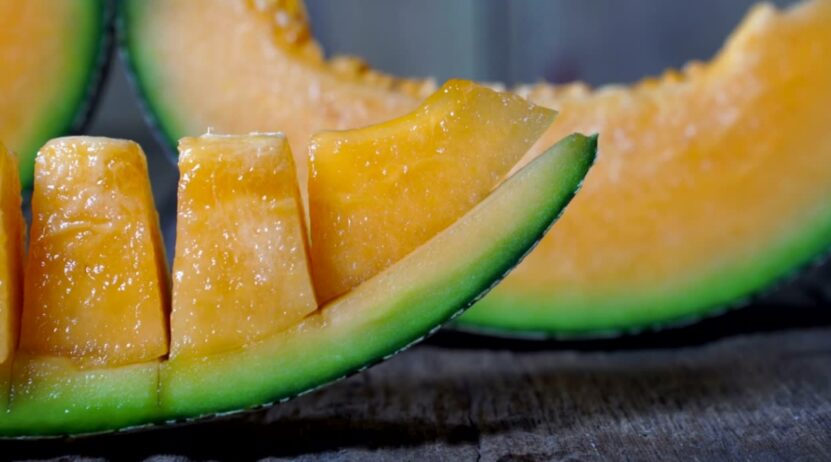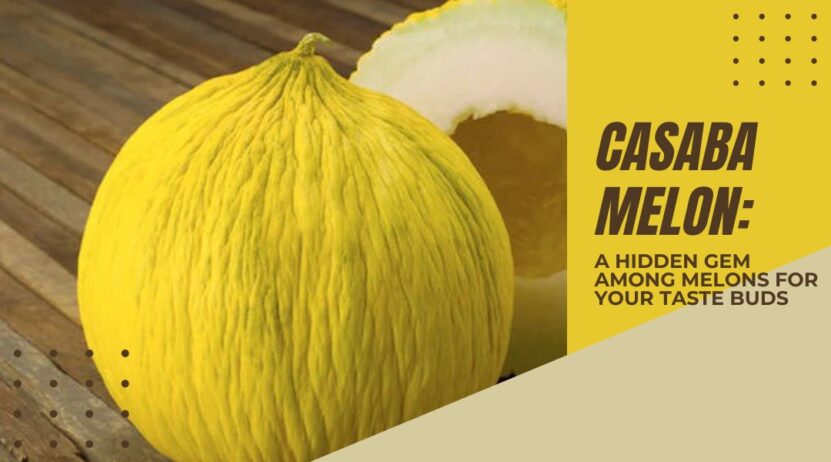Casaba melons may not possess the same intense flavor as some other melon varieties, but they do offer unique qualities that make them worth considering. While their taste may be milder, Casaba melons excel in their exceptional ability to be stored for extended periods compared to many other melon types.
This characteristic sets them apart and makes them an appealing choice for those seeking a melon with a longer shelf life. Despite their subtle flavor profile, Casaba melons have their own charm and can be enjoyed in various ways.
Usage

- Raw in Fruit Salads: The sweet and mildly flavored flesh of Casaba melons can be cut into bite-sized pieces and added to fruit salads. Its firm texture adds a refreshing element to the mix of fruits.
- Fruit Platters: Casaba melon slices can be arranged on fruit platters alongside other fruits like berries, grapes, and citrus segments. They add a pop of color and a unique taste to the overall presentation.
- Carved Centerpiece: Due to their large size and attractive appearance, Casaba melons can be carved into intricate designs and used as eye-catching centerpieces for special occasions or events. This can be a creative way to impress guests and showcase your artistic skills.
To use Casaba melons in these ways, simply wash the melon, cut it in half, remove the seeds, and then cut the flesh into the desired shapes or slices. Ensure that the melon is ripe and at room temperature for the best flavor and texture.
Selection
When selecting a Casaba melon, look for the following qualities:
- Size and Firmness: Choose a melon that is fairly large and feels firm to the touch, with a slight softness at the stem end.
- Color: The melon should have a rich yellow color, with minimal green on the skin.
- Rind Texture: A ripe Casaba melon will have a ridged rind if it has been allowed to ripen on the vine. The skin should also have a slightly waxy feel when touched.
- Audible Seeds: Shake the melon gently and listen for the sound of seeds rattling inside. This indicates juiciness.
- Bleached Side: Some melons may have a bleached side that rested on the soil, but this does not affect the quality.
Health Benefits

Casaba melons offer several health benefits due to their nutritional composition. Here are some potential health benefits associated with consuming :
- Rich in Antioxidants: Casaba , like other melons, contain antioxidants that help protect the body against oxidative stress caused by harmful free radicals. Antioxidants are known to reduce the risk of chronic diseases and support overall well-being.
- Hydration: With their high water content, are a hydrating fruit choice. Staying adequately hydrated is essential for maintaining proper bodily functions, promoting healthy skin, supporting digestion, and regulating body temperature.
- Vitamin C Boost: Melons are a very good source of vitamin C, an essential nutrient that supports the immune system, and collagen synthesis, and acts as a powerful antioxidant. Consuming foods rich in vitamin C may help boost immunity and promote healthy skin.
- Vitamin K for Bone Health: Melons are a good source of vitamin K, which plays a crucial role in bone health. Vitamin K helps activate proteins necessary for bone mineralization and helps improve calcium absorption, contributing to optimal bone density and strength.
- Potassium for Heart Health: They contain potassium, an important mineral that helps regulate blood pressure and maintain heart health. Adequate potassium intake is associated with a reduced risk of hypertension and cardiovascular diseases.
- Copper for Energy Production: They are a source of copper, a trace mineral involved in energy production, collagen synthesis, and iron absorption. Copper also acts as an antioxidant and supports the function of several enzymes in the body.
- Vitamin B6 for Metabolism: They provide vitamin B6, which plays a vital role in energy metabolism, brain development and function, and the production of neurotransmitters. Vitamin B6 also contributes to the synthesis of red blood cells and supports immune system function.
Avoid
When choosing a Casaba melon, avoid the following signs of poor quality:
- Rough Stem End: If the melon has a rough stem end with portions of the stem remaining, it likely means it was harvested too early.
- Green Coloring: Melons with green skin indicate they are not fully ripe.
- Soft or Sunken Spots: Check for any soft or sunken spots on the melon’s skin, as they may indicate spoilage.
- Dark and Dirty Spots: Moldy-looking dark spots or dirty spots are also signs of poor quality.
Storage

Follow these guidelines for storing Casaba melons:
- Refrigeration: Only refrigerate melons that have become too ripe or have been cut. Store whole ripe or cut melons between 40°F and 45°F (4°C to 7°C).
- Moisture Retention: To keep a cut melon moist, leave the seeds inside.
- Wrapping: Wrap cut melons before storing them in the refrigerator.
- Room Temperature: For the best flavor, allow refrigerated melons to reach room temperature before eating.
Freezing melons is not recommended.
Ripening
After Casaba melons are harvested, they will continue to undergo some ripening, although their sugar content does not increase significantly during this process. To allow the melons to reach their optimal flavor and juiciness, follow these guidelines:
- Room Temperature Ripening: Place them in a cool, dry area at room temperature. This will allow them to ripen gradually. It usually takes around four days for the melons to ripen and develop a juicier texture.
- Ethylene Sensitivity: Melons are sensitive to ethylene gas, which is a natural plant hormone that promotes ripening. To speed up the ripening process, you can place the Casaba melons in close proximity to ethylene-producing fruits such as apples, bananas, or tomatoes. The ethylene released by these fruits can help accelerate the ripening of the Casaba melons.
It’s important to monitor the melons closely during the ripening process, as they can become overripe if left for too long. Check the melons daily for any signs of softening and sweetness. Once they reach the desired level of ripeness, you can either consume them immediately or store them in the refrigerator to extend their shelf life.
Nutritional Information

Casaba melons offer the following nutritional benefits:
- Low Sodium: They are low in sodium.
- Low Saturated Fat and Cholesterol: Casaba melons contain very little saturated fat and cholesterol.
- Dietary Fiber: They are a good source of dietary fiber.
- Vitamins and Minerals: Casaba melons are rich in Vitamin K, Potassium, and Copper. They are also a very good source of Vitamin C and Vitamin B6.
Tips & Trivia
Here are some additional tips and trivia about Casaba melons:
- Aroma: Unlike other melons, do not have a strong aroma, even when fully ripe.
Please note that the information provided is based on general knowledge about melons. Individual preferences and conditions may vary, so it’s always a good idea to use your judgment and personal taste when selecting and consuming melons.

